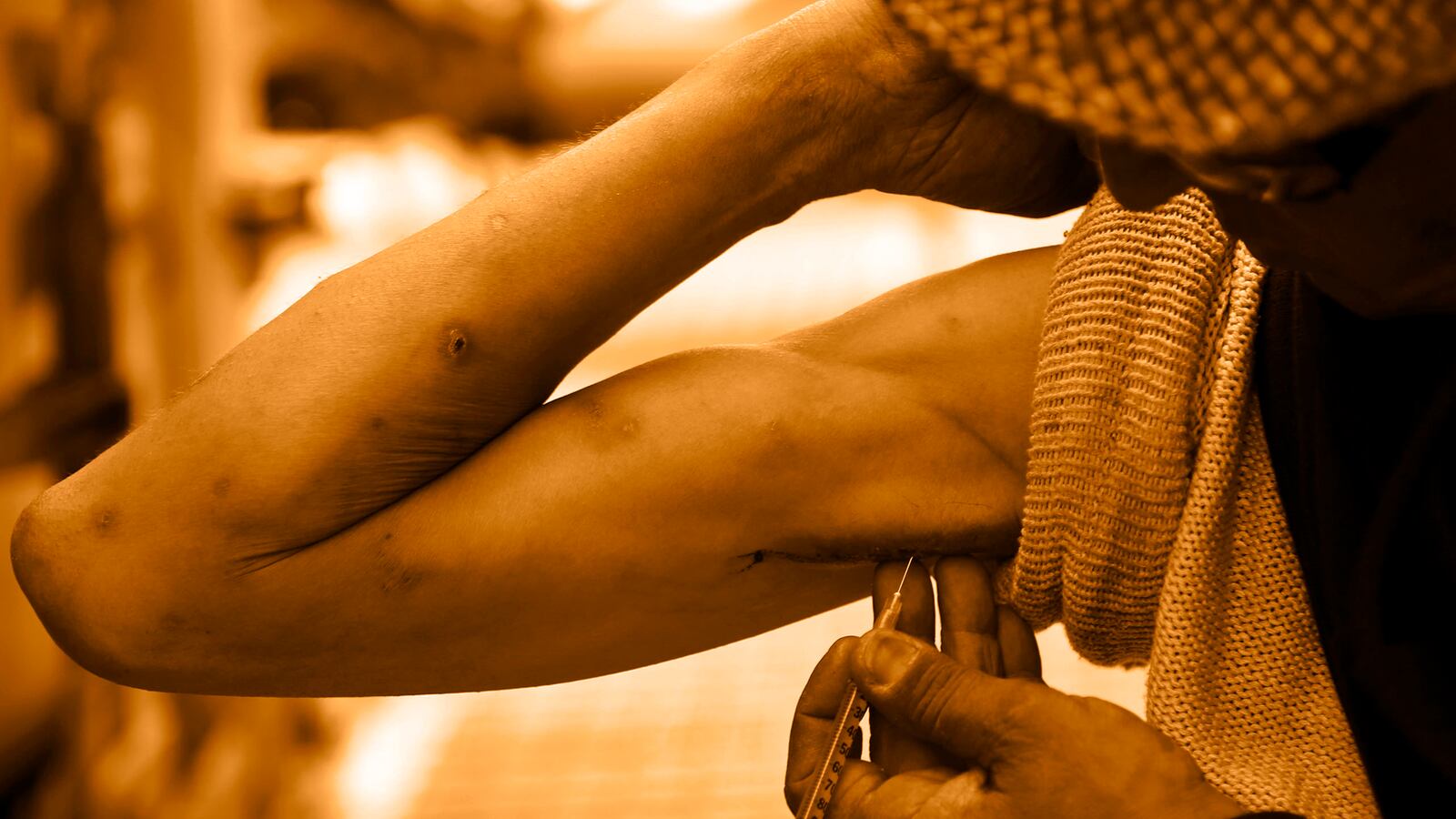ATHENS—Outside a café just blocks off Omonia Square, a bustling marketplace in downtown Athens, Greeks in puffy jackets and worn blue jeans struggled to stay awake on a Spring afternoon, even as they sipped espresso and chain-smoked.
One could walk right past the place without knowing it’s where old Greeks go to hang out and snort heroin.
Inside the café, called “The Meeting,” stale cigarette smoke hung from the ceiling. I sat on a rickety chair against a wall facing a dark-haired Greek man who sat facing the door at the head of a long table. His eyes moved from his small black cell phone to the door as customers appeared. Below the table, he expertly handled a large baggie stuffed with several dozen smaller baggies containing low-quality heroin. Aging Greeks walked in and handed the dark-haired man five, sometimes 10 euros. Then they’d walk downstairs to the café’s basement, which they call “cockroaches,” where they’d snort the brown powder that smelled a little like vinegar.
Then they’d find a chair and light a cigarette. Some dozed off. Others stared toward their toes. A few kept up conversation, gossiping about friends.
“The heroin is shit,” Marios whispered.
***
Marios Atzemis is a former customer of the café. Between 1998 and 2009, Marios bought his heroin and cocaine up and down the narrow brick roads of downtown Athens. Now, at 42, he’s a public health advocate for Positive Voice, also known as the People Living with HIV Association. Marios is one of few people in Athens who is vocal about both his injection drug use and being HIV positive. His streetwise acumen is an asset for agencies trying to contain HIV infections, which tends to spread from prostitution and injection drug use.
“No one would ever take you here,” Marios told me as we sat down. He ordered me an orange Fanta from the cafe’s owner, a bald man who walked around with an apron and a notebook—just like any other cafe. I wondered why Marios was set on showing me The Meeting.
***
As an American journalist, I cover drug policy with a focus on America’s ongoing opioid crisis. Despite sympathetic awareness campaigns with bipartisan support, America’s opioid problem has only worsened over the years. The death toll rises higher and higher while legislators entangled in American mortality form more task forces and commissions. Meanwhile, heroin overdose deaths have more than quadrupled since 2010.
As a former opioid and heroin user myself, it’s become both a personal journey and journalistic endeavor to understand the sharp rise of addiction and mortality. Global drug trends and policy form one piece of the puzzle. But getting to know drug users, how they live and who they are, which tends to be an afterthought in policy debates, provides the clearest window into the epidemic’s causes and conditions.
I came to Athens from America with firsthand knowledge. But Greece has many crises of its own. The latest estimates of the country’s debt load rings in at nearly €300 billion ($319 billion). Part of every debt relief package comes with harsh austerity measures. Since the 2008 crisis, Greeks have seen 12 tax hikes and 12 cuts to their pensions.
Older Greeks, like the ones inside The Meeting, have seen pensions they’ve paid into their whole lives nearly vanish. As a result, Greece’s elderly population has seen a rise in drug use and suicide. Deaths now outpace births. Doctors and engineers are fleeing for greener pastures and they’re not coming back. The country shrinks in its despair.
***
The United States is seeing a similar decline caused by so called deaths of despair. Suicide, overdose and alcoholism among white, middle-aged Americans has been so high that for the first time since the turn of the century, after decades of progress, America saw a decline in overall life expectancy, according to the research of two Princeton economists, Anne Case and Angus Deaton (PDF). Their explanation? “Cumulative disadvantage” over the course of one’s life, which they write is “triggered by progressively worsening labor market opportunities… for whites with low levels of education.”
Essentially, income protects people from disease and other social ills. A generation of 45-54 year olds who thought they’d be financially better off find themselves adrift in a global economy that’s left them in the dust of industrial obsolescence. It turns out counties across New England, the Industrial Midwest and the Rust Belt, slow to recover from the 2008 crisis, are dying these deaths of despair. The same counties also overwhelmingly supported President Trump.
In Greece, this sense of a society in extremis is even more profound.
“When someone is without a job they feel a loss of meaning—hopeless and worthless,” said Babis Poulopoulos, a professor of social work at the University of Thrace, whose recent book, Crisis, Fear and the Breakdown of Social Cohesion, showed the way Greece’s financial problems are undoing society. “These older people feel like a burden to their families—they’ve lost their human dignity,” he said. This, in part, explains why Greece’s suicide rate rose overall by 35 percent between 2010 and 2012. Researchers have also found a significant correlation between the increase in suicide with a rise in unemployment, which hovers around 23 percent. It’s even higher among young people.
But the suicide statistics do not capture the whole picture. “It’s not suicide unless there’s a note, so when somebody falls from a fourth floor without leaving a note, it’s an accident,” Poulopoulos said. And if the next of kin want the deceased to have a Christian burial, there’s another issue: “Since the Orthodox Church doesn’t permit suicide, doesn’t accept suicide, it doesn’t give the opportunity for the family to have a formal funeral.”
Suicide is a major sin for Greece’s conservative Orthodox Church. But in 2015, the Holy Synod, a 12-member body of clerics that oversee church affairs, drew up new guidelines that allow priests to bury suicide victims so long as the person was not “sane” when the act was carried out. Known as the “suicide clause,” it’s broad enough for most metropolitans or bishops to allow the burial of suicide victims. Still, the stigma remains so strong that many suicides are not counted as such.
***
Those who don’t commit suicide opt for a slower version of it.
Poulopoulos is also the former president of Greece’s Center for Therapy of Addicted People, otherwise known as KETHEA. He wasn’t surprised to hear that there’s a café where old Greeks hang out to do heroin.
“Young people with a university degree have difficulty finding a job,” he said. “Drug users, former prisoners, all unemployed and uneducated, don’t have a chance.”
Aside from the dark-haired dealer, everyone inside the cafe is unemployed.
“These people don’t have a lot. They’re some of the most socially excluded people in Greece,” Marios said.
Looking around the smoky room, Marios explained that if you have a history of drug use, are HIV positive or have Hepatitis C, no one wants to touch you, let alone hire you while a hundred thousand other unemployed Greeks without such problems compete for jobs.
Marios is tragically lucky. He’s gainfully employed at Positive Voice while being vocal about having HIV, Hepatitis C (though his liver enzymes are healthy) and a drug using history.
“Positive Voice was one of the first organizations to hire gays, transgender people and drug users,” Marios said.
Nikos Dedes founded Positive Voice in 2009. Dedes was angered by a Greek Supreme Court decision that ruled in favor of letting employers fire someone solely because of their HIV status. “Because it ‘disrupted workplace tranquility,’” said Dedes.
Positive Voice also emerged at the same time as an HIV outbreak caused by prostitution and injection drug use. By 2011, HIV among injection drug users increased 16-fold, according to the Hellenic Centre for Disease Control and Prevention. Seventy percent of those cases were traced back to Athens, Omonia Square in particular, not far from The Meeting, where prostitution also is prevalent.
“Now we give away condoms, needles and most of all, information to people on the street,” Marios said. Ever since 2013, HIV rates attributed to drug use have been decreasing (PDF).
***
In March 2015, a small conservative county in southeast Indiana saw its very own HIV outbreak triggered by rampant injection drug use. Vice President Mike Pence, then-governor of Indiana, was forced to confront a moral quandary. Would he lift the state’s ban on syringe exchange programs in order to contain the infection, which was caused by drug users sharing needles? Some used the same needle until it broke inside their arm.
Governor Pence’s response? He said he had to pray about it. What he could have done as well was consult nearly 40 years of evidence supporting the efficacy of syringe exchange programs in reducing blood-borne disease.
Pence eventually lifted the ban on syringe exchange programs, but in the case of “emergencies.” Hundreds of syringes were eventually doled out, and the problem, which researchers have said was “entirely preventable,” was contained.
But there’s something else unique about rural Scott County Indiana, where the outbreak occurred. In a county of 24,000 people, nearly 500 were regularly injecting drugs—a whole 2 percent of the residents. Of Indiana’s 92 counties, Scott County at the time had the lowest life expectancy and one of the highest unemployment rates. A total of 19 percent of its residents lived below the poverty line, and 21 percent never finished high school.
Centers for Disease Control spokesperson John Brooks, during a conference on retroviruses and opportunistic infections, noted all the startling statistics above while discussing the HIV outbreak.
***
It’s no coincidence that a county left behind in the United States, full of the “forgotten people” that President Trump refers to in his populist speeches, suffers from the same social and medical ills experienced by the lowest rungs of Greek society.
But there’s also a difference I recognized while I was hanging out at the heroin café. Rather than seeing its naked despair—old Greeks nodding their days away—I saw its allure. It’s a place for people to feel a sense of belonging in a society that rejects them.
“If it weren’t for the café, these people would sit on their couch alone in their tiny apartments,” Marios said. And it dawned on me, that’s where most of the overdoses in rural-America occur: inside a bedroom or on the couch, when people are alone. They’re often found when they’re cold and blue, long after they overdosed. At least the old Greeks have a place to go, I thought, even if it’s The Meeting, down to a basement they call “cockroaches.”
The dark-haired Greek’s tiny black phone buzzed. He answered it and his eyebrows raised. He hung up after saying a few words. Then he stood up and clutched the bag stuffed with other tiny bags and walked out the front door.
Greek Police on motorbikes showed up minutes later. Someone had tipped him off that they were coming. Whoever it was, I thought, just wanted to protect the product. But in doing so, is also preserving The Meeting—a place for old Greeks.





